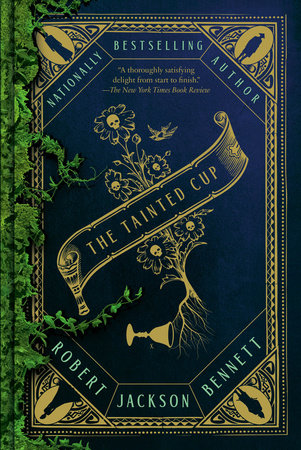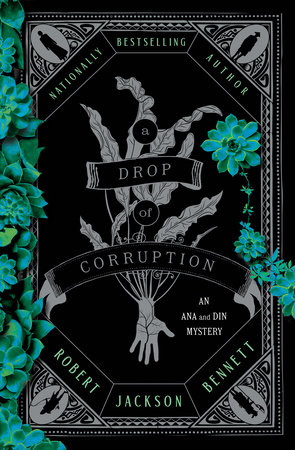Excerpt
The Tainted Cup
Chapter 1
The walls of the estate emerged from the morning fog before me, long and dark and rounded like the skin of some beached sea creature. I walked along them, trying to ignore the flutter of my heart and the trickle of sweat down my neck. A faint blue light glimmered in the mist ahead. With each step it calcified into a mai-lantern hanging above the estate’s servants’ gate; and there, leaning against the walls beside the gate, was the figure of a uniformed man in a shining steel cap waiting for me.
The princeps watched me approach. He cocked an eyebrow at me, and it climbed higher up his forehead the closer I came to him. By the time I’d finally stopped before him it’d almost joined the hair atop his head.
I cleared my throat in what I hoped was an authoritative manner, and said, “Signum Dinios Kol, assistant to the investigator. I’m here about the body.”
The princeps blinked, then looked me up and down. Being as I was nearly a head taller than him, it took him a moment. “I see, sir,” he said. He gave me a short bow—a quarter of a full bow, maybe a third—but then did not move.
“You do have a body, yes?” I asked.
“Well, we do, sir,” he said slowly. He glanced over my shoulder down the fog-strewn lane behind me.
“Then what seems to be the issue?”
“Well, ah . . .” Again, a glance down the lane behind me. “Pardon, sir, but—where’s the other one?”
“I’m sorry?” I asked. “Other one?”
“The investigator? When will she be arriving?”
I suppressed a flicker of worry. I’d dealt with this question when working other matters for my master, but doing so when the situation involved a dead body was another thing entirely. “The investigator isn’t able to attend,” I said. “I’m here to review the scene, interview the staff and any witnesses, and report back to her.”
“The investigator is choosing to proceed with the investigation . . . without being present?” he said. “Might I ask why, sir?”
I took him in. His short mail shirt glinted in the low light, each ringlet dabbed with tiny pearls of condensation. Very fancy. Ornate belt at his waist, slightly soft belly hanging over the buckle—a consequence of early middle age. Same for the thread of gray in his beard. Black boots highly polished, trim woven with seaweed-stained leather. The only standard-issue item on his body was the longsword in his scabbard and his dark red cloak, indicating he was an Apothetikal: an imperial officer responsible for managing the Empire’s many organic alterations. The rest of it he must’ve purchased himself, probably for a princely sum.
All this told me that even though I was a signum and thus technically outranked him, this man was not only older and wealthier than me, but he’d probably seen more in his career than I could imagine. I couldn’t blame him for wondering why the investigator had sent this twenty-year-old boy in ratty boots to a death scene all on his own.
“The investigator usually is not present at investigations, Princeps,” I said. “She sends me to assess the situation and uses my report to make the appropriate conclusions.”
“The appropriate conclusions,” the princeps echoed.
“Correct,” I said.
I waited for him to permit me inside. He just stood there. I wondered if I was going to have to order him to let me into the estate. I’d never given a direct order to an officer of another imperial administration before and did not entirely know how to go about doing it.
To my relief, he finally said, “Right, sir . . .” and reached into his pocket. He took out a small bronze disc with a little glass vial set in the center, which sloshed with black fluid. “You’ll need to follow close, sir. This gate is a bit old. Can be fussy.”
He turned to face the servants’ gate: a rounded aperture in the smooth black surface of the estate walls. Hanging on the other side of the aperture was a veil of curling, furred vines of a greenish-yellow color. They trembled as the princeps approached—a disquieting, juddering tremor—and fell back, allowing us to enter.
I kept close to the princeps as we walked through the gate, leaning down so my head didn’t scrape the top. The vines smelled sweet and sickly as they tickled the back of my neck. Likely altered to seek out flesh, and if the princeps hadn’t been carrying his “key”—the vial of reagents in his hand—then the two of us would have been paralyzed, or worse.
We emerged into the estate’s inner yards. Dozens of mai-lanterns twinkled in the morning gloom ahead of us, dangling from the gabled roof of the sprawling house set high on the hill beyond. A verandah wrapped around the home, rope nets blooming with bright decorative moss to shield windows from the morning sun. Floors wide and smooth, wood polished to a fine shine. A cushioned section sat on the eastern end—a miniature tea pavilion of a sort, but instead of a tea table there sat some massive animal’s skull, its cranium shaved off to be level. A rather ghoulish adornment for so fine a place—and it was a fine place, easily the finest house I’d ever seen.
I looked at the princeps. He’d noticed my astonishment and was smirking.
I adjusted my Iudex coat at the shoulders. They hadn’t been able to find one my size, and I suddenly felt terribly stupid-looking, packed into this tight blue fabric. “What’s your name, Princeps?” I asked.
“Apologies, sir. Should have mentioned—Otirios.”
“Have we identified the deceased, Otirios?” I asked. “I understand there was some issue with that.”
“We think so, sir. We believe it is Commander Taqtasa Blas, of the Engineers.”
“You believe it is? Why believe?”
This drew a sidelong glance. “You were informed that the nature of his death was an alteration, yes, sir?”
“Yes?”
“Well . . . Such things can make it tricky to identify a body, sir.” He led me across a small wooden bridge that spanned a trickling stream. “Or even,” he added, “to identify it as one, sir. That’s why we Apoths are here.”
He gestured at the fog beyond. I searched the mist and spied figures roving through the gardens, also wearing coats and cloaks of dark red, all carrying what one might mistake to be birdcages; yet each cage contained not a bird, but a delicate fern.
“Checking for contagion,” said Otirios. “But so far we’ve found nothing. No telltale plants have browned or died yet, sir. No sign of contagion on the estate grounds.”
He led me to a thin fernpaper door in the estate house. As we approached I thought I heard some long, sustained sound within the mansion. I realized it was screaming.
“What’s that?” I asked.
“Probably the servant girls,” Otirios said. “They were, ah, the ones who got there first. Still quite agitated, as you can imagine.”
“Didn’t they find the body hours ago?”
“Yes. But they keep having outbursts. When you see the body, you’ll understand why, sir.”
I listened to the screams, wild and hysterical. I fought to keep my face clear of emotion.
I told myself to stay controlled and contained. I was an officer for the Iudex, the imperial administration responsible for managing the high courts and delivering justice throughout the Empire. I was supposed to be at this fine home, even if it was filled with screaming.
Otirios opened the door. The sound of the screaming grew far louder.
I reflected that piss was supposed to stay in my body, but if that screaming went on for much longer, that might not stay the case.
He led me inside.
The first thing that struck me was the cleanliness of the place. Not just the absence of dirt—though there was no dirt, not a smudge nor smear in sight—but there was a sterility to everything before me, no matter how elegant: the dining couches were too smooth and unblemished, and the woven silk mats laid in squares on the floor were too unspoiled, perhaps having never known the tramp of a foot. The whole house felt as cozy and comfortable as a surgeon’s knife.
Which wasn’t to say it was not opulent. Miniature mai-trees had been altered to grow down from the ceiling, acting as chandeliers—something I’d never seen before—their fruits full to bursting with the glowing little mai-worms, which cast a flickering blue light about us. I wondered if even the air was expensive in here, then saw it was: a massive kirpis mushroom had been built into the corner of every main room—a tall, black fungus built to suck in air, clean it, and exhale it out at a cooler temperature.
The shrieking went on and on from somewhere in the mansion. I shivered a little, and knew it had nothing to do with the temperature of the air.





